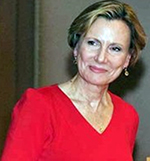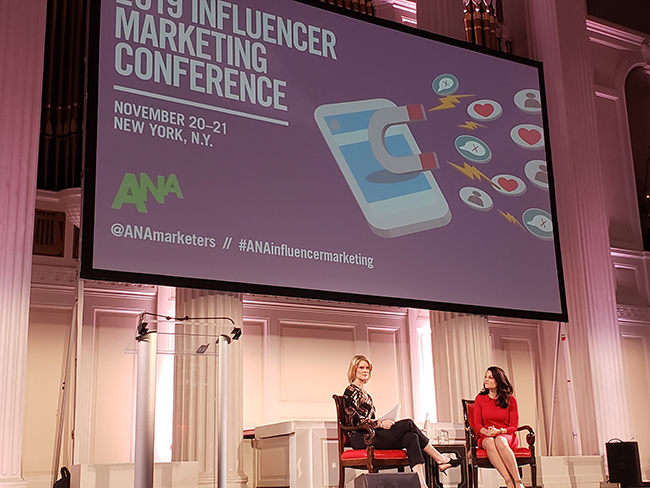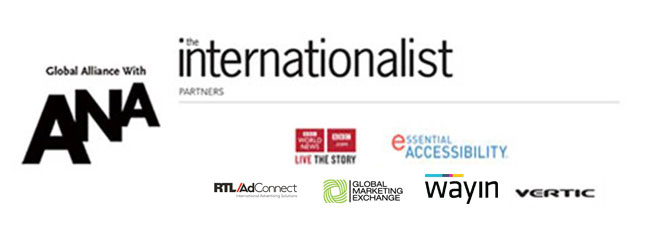

Unilever’s Casey DePalma
See the current issue
of The Internationalist magazine
Find out how to sponsor an issue of Trendsetters
|
|
If you have spotted a trend or given a recent presentation on a global issue, please tell use and don't forget a photo of yourself!

To submit to Trendsetters, contact me at: linkedin.com/in/deborah-malone-ab5897,
The Internationalist group on LinkedIn:
https://www.linkedin.com/groups/2560753/or at Twitter--@DMaloneIntl
TRENDSETTERS: Unilever’s Casey DePalma Advocates that Marketers Think Strategically and Long Term about Influencers
The Internationalist Trendsetters is written by Deborah Malone, founder of The Internationalist.
Unilever's Casey DePalma believes that marketers need "to think strategically and long term" about how they work with influencers. Ms. DePalma is Head of Public Relations, Influencer Marketing and Digital Engagement at Unilever North America and was sharing her views in a fireside chat with eMarketer's Principal Analyst, Debra Aho Williamson, at the ANA's first Influencer Marketing Conference in New York in late November.
Brands are expected to spend up to $15 billion on influencer marketing by 2022, according to data from Mediakix, the Santa Monica-based Influencer Marketing agency. While more marketers are investing in all variety of influencers-- (from celebrity to "micro" and "nano" to "CGI" or computer-generated imagery)-- and reporting strong sales results, there are still industry-wide concerns about rising levels of fraud and shifting social media algorithms, as well as complex attribution and measurement. In fact, eMarketer data presented at the conference estimates that 15% of all influencer spending is currently lost to fraud—often through fake accounts, fake followers, bots and dishonest business models-- representing roughly $1.5 billion in 2019.
Casey DePalma said that Unilever "is working to restore or maintain trust and transparency in the influencer space." She cited how 18 months ago, Unilever CMO Keith Weed took an aggressive stand by calling for "urgent action to tackle influencer fraud and rebuild trust before it's gone forever." He also stated that the consumer products giant would not support influencers with fake followers or those who buy followers. According to Ms. DePalma, "Our brands will only work with people eradicating these bad practices. It was a watershed moment. However, it was a conversation that needed to be had."
Since then, Unilever has had discussions with thousands of influencers across categories ranging from beauty and personal care to foods and refreshments about issues of transparency, fraud and maintaining authenticity. The corporation now uses a system of tools worldwide to better vet influencers. "We look to get a 'gut check,'" says Ms. DePalma. "We're looking for engagement that might seem off from an influencer's core trends. While we understand that this is a fast-evolving space without easy black and white answers, we're still having conversations we've never had before as we strive to ensure that an influencer's engagement is authentic."
Casey DePalma also admits that there's many definitions of fraud in influencer marketing-- from the extreme of the Fyre Festival (the fraudulent luxury music festival created with the intent of promoting the company's Fyre app for booking music talent) to fake followers to an influencer or creator who misrepresents their true identity. She adds that working with influencers is both an art and science—especially when it involves marrying an influencer's values with those of a brand or company. "It takes real human vetting and understanding." While she says there is no "silver bullet" to legitimize influencer marketing, she believes that building long-term relationships is key.
"At Unilever, we've moved from the spray and pray approach. We don't need to work with thousands of influencers but prefer to build a network of advocates for the brands. There's no 'one size fits all' for us in terms of using macro or micro influencers. We're just focused now on growing the influencer relationship, so it becomes mutually beneficial. . . . and that means thinking strategically and long term."
Unilever's Casey DePalma is keenly aware that the influencer space is moving rapidly to become a new channel for marketers. She reminds her peers: "Remember, with any new media channel there are challenges and opportunities. Don't accept the status quo. Always ask: How do we frame this more positively? What can we do to further the space, so it can be more accepted and better validated for marketing?"
Casey DePalma oversees the earned media strategy and execution for Unilever's portfolio of more than 25 beauty, person care, foods and refreshments brands. She also leads Unilever's global influencer marketing strategy and the push to eradicate fraud from the influencer space.
Prior to join Unilever in 2010, he served as SVP at LAK Public Relations. She holds a B.S. in Marketing from Boston College and an M.A. in Integrated Marketing Communications from Emerson College.

